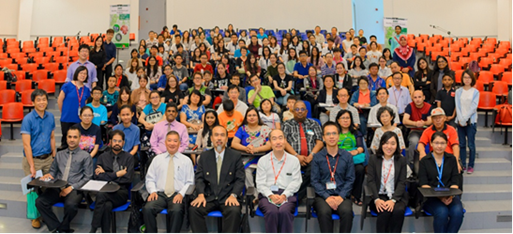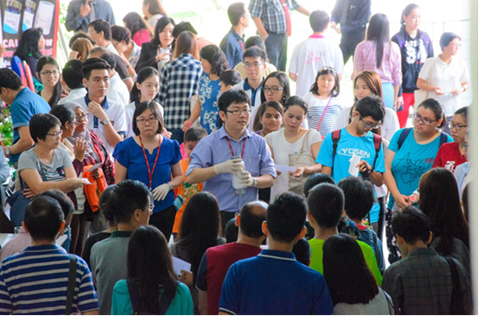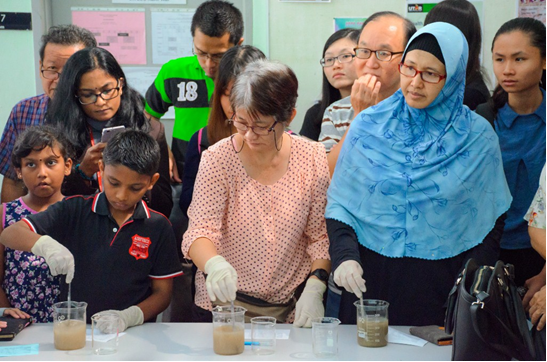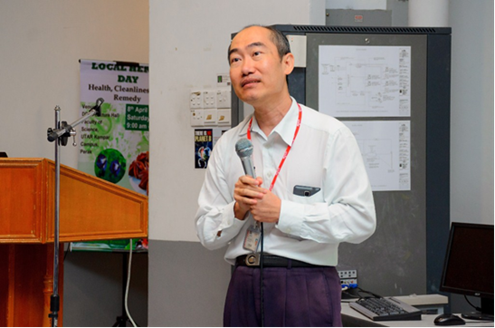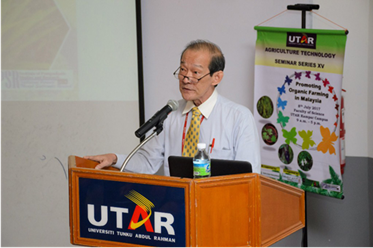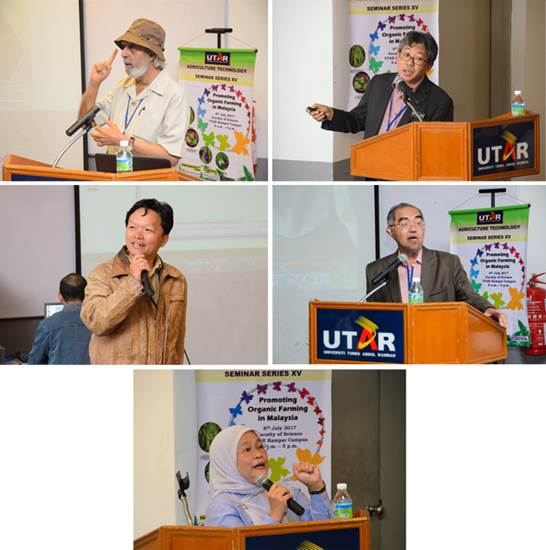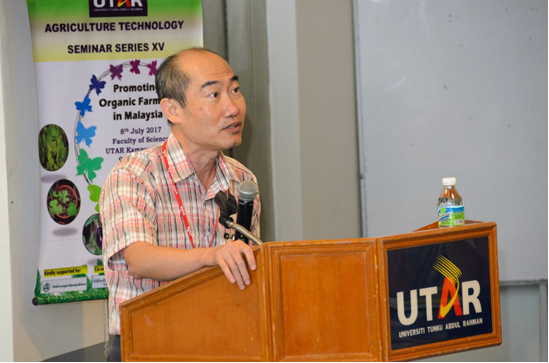Activities Report
UTAR Herbs Day: Health, Cleanliness and Remedy |
|---|
Date: 8 April 2017
UTAR Centre for Biodiversity Research (CBR), the Faculty of Science (FSc) and the Institute of Postgraduate Studies and Research (IPSR) jointly organised the Local Herbs Day for the first time at UTAR Kampar Campus on 8 April 2017. Attended by over 150 participants consisting UTAR staff, students and the general public, the community outreach event was themed ‘Health, Cleanliness and Remedy’ and served as a platform in introducing as well as raising awareness on the usages of local herbs. According to Organising Chairperson Dr Teh Lai Kuan, Malaysia’s tropical weather engenders the prolific growth of a variety of local herbs but some of their proper usages remain unknown. “As this event introduces us to the local herbs, we are proud to have four speakers, from Malay, Chinese and Indian background, to provide their insights about the herbs. Besides the talks, there are also exhibition and a mini workshop on herbal soap making,” said Dr Teh.
Lending more significance to the event was the presence of four experts, namely Herbwalk Consultancy Principal Consultant Dr Abdul Ghani Hussain, KL Academy of Traditional Chinese Medicine academic Haw Ming Hock, AK Pharmacy & Naturopathy Center founder Prof Dr Ananthan N. G. Krishnan, and founder of PK Herbal Research Centre Lee Chin Yoong, who opened the participants’ eyes to the myriad local herbs and their uses in different traditions, be it Chinese, Malay or Indian.
Dr Abdul Ghani, who is also a scholar in Malay Medicine, spoke about ulam as the perfect supplement for health maintenance. Inspired by his encounter with a group of elderly fishermen residing in Langkawi island, Dr Abdul Ghani discovered that the secret to their longevity lies within the simplicity of their diet and livelihood. “Their diet consists of fresh ulam as well as small fish. In fact, they rarely take poultry and only slaughter reared chicken or buffaloes for special occasions,” said Dr Abdul Ghani, as he introduced the different types of ulam as well as their scientifically proven nutritive values and medicinal properties. The following talk titled “Applied Herbs in Family Uses” was delivered by Chinese Physician-cum-Herbal Instructor Haw. He highlighted certain precautions and considerations on the consumption of herbal medicine as the side effects of different herbs may vary. During his talk, Haw used six commonly seen local herbs, namely Kyllinga brevifolia Rottb (shortlead spikesedge), Stachytarpheta jamaicensis (blue snakeweed), Cassia obtusifolia (sicklepod), Sida rhombifolia L (arrowlead sida), Hedyotis diffusa (snake needle grass) and Cardiospermum halicacabum (balloon plant) to underline their healing properties for diseases ranging from hypertension to cancer. Prof Ananthan spoke on “The Use of Highly Active Micro-Nutrient Formulae for the promotion of Wellness and Management of Illness” which summarised the pressing need for progressive reformation in our healthcare system. He elaborated the development and progress of healthcare and medicine and also the challenges hindering the creative progress of science, including medicine. Prof Ananthan also talked about the new concept of bio-chemical equilibrium and balance and human health, and the nature of the ideal product to maintain health and cure illnesses which is the downsizing of chemical therapeutics. Chinese Physician-cum-Herbal Instructor Lee, who hails from Ipoh spoke about “Basic Rule to use Herbs”. According to Lee, prior to applying herbs, one will need to use the four methods of diagnosis – inspection, auscultation and olfaction, inquiry, and pulse-taking and palpation – followed by the eight principle syndromes – yin and yang, exterior and interior, cold and heat, hypofunction and hyperfunction – and then the six factors in nature – wind, cold, summer, heat, humidity, dryness and fire – to determine the use of herbs. He also demonstrated to the participants the authenticity of herbs through inspection, sensation, olfaction and tasting. The participants also had a chance to try their hands at making herbal soap at a workshop conducted by Head of Department of Biomedical Science Dr Tan Gim Cheong. An exhibition on herbs was also another avenue for the participants to know better how certain herbs are cultivated and the ways to identify them.
The inaugural event came to a conclusion with FSc Dean Assoc Prof Dr Lim Tuck Meng expressing his delight over the success of the event. “A university is an institution to create, preserve and disseminate knowledge. In UTAR, we have established an agricultural park in which we plan to build a herb garden where we could collect herbs from different traditions such as the Chinese, Malays, Indians and including Orang Asli. Hopefully this knowledge will be preserved for the future generations,” Dr Lim said. He also mentioned it will be intriguing to look into how the different traditions treat the same types of diseases and that the information collected will then be shared with the community.
|
| Agriculture Technology Seminar Series XVIII – Promoting Organic Farming in Malaysia |
|---|
Date: 8 July 2017
UTAR Centre for Biodiversity Research (CBR) and the Institute of Postgraduate Studies and Research (IPSR) organised the 15th Series of the Agriculture Technology Seminar at UTAR Kampar Campus on 8 July 2017. Welcoming the participants was CBR Chairperson Dr Wong Wey Lim, who related his childhood experience of planting and harvesting vegetables which were then sold for extra income. “Organic farming is not something new to many of us. In fact, today, organic farming is a multi-billion industry and more people are concerned about food security. Some of our questions and doubts will be addressed by the speakers who have extensive knowledge in organic farming,” said Dr Wong who also hoped that the students, public, industry players and speakers will take the opportunity to interact with one another to improve organic farming and enhance awareness of it in Malaysia.
Organising Chairman Prof Peter Ooi Aun Chuan concurred and said, “As each country reaches its economic target, it has been noticed that the citizens have changed their purpose of eating. Malaysia is no exception and the desire to have more nutritious food has been in the focus of science to identify what is good, what is bad and what we need to improve in our production and consumption.” He added that there is a need for scientific development input to meet the demand of our citizens and one such development is called healthy food in organic farming. Further stating that there are continuous researches in these areas by institutions of higher learning such as UTAR and others in Malaysia, Prof Ooi also extended his appreciation to the experts, the moderators as well as the sponsors.
The speakers included Centre for Environment, Technology & Development, Malaysia (CETDEM) Chairman Gurmit Singh, MARDI Deputy Director General Dr Mohamad Roff bin Mohd Noor, seasoned organic farmer Ng Tien Khuan, Universiti Putra Malaysia Faculty of Agriculture’s Assoc Prof Dr Hafidzi Mohd Noor, Koperasi Agro Belantik Sdn Bhd Technical Advisor Kapten (B) Zakaria bin Kamantasha and Deputy Director of Department of Agriculture Malaysia’s Crop Quality Control Division Rosmawati binti Selamat. Explaining the characteristics of the local Organic Farming as well as surveying its history in his talk “Organic Farming in Malaysia – An Overview”, Gurmit shed light on the hurdles of the promotion of organic farming in Malaysia. The CETDEM Chairman also explained the ongoing challenges and suggested improvements needed to overcome them. “Strengthening Organic Agriculture in Malaysia through Research and Technology Development” by Dr Roff presented that Malaysia’s organic farming received government support through the Malaysian Organic Certification Program (myOrganic) by the Department of Agriculture (DOA) as well as research and development by the Malaysian Agriculture Research & Development Institute (MARDI). “Under the 10th Malaysia Plan, organic farming research was further widened to include technology development, where emphasis was given catering the need of local farmers for effective and certified organic inputs to ensure higher and more sustainable yield. Low yield and increase in production cost are the major drawbacks in organic farming,” explained Dr Roff, who added that organic farming in Malaysia is a gem waiting to be expanded from niche market to commercial production following the increasing demand for healthy and safe food consumption in Malaysia and neighbouring countries. “Such sustainable agriculture development needs continuous support through further strategized R&D, improved organic agriculture regulations and more effective marketing strategies,” he concluded. Mr. Ng Tien Khuan spoke on “Biodynamics of Organic Farming” by explaining that Bio-Dynamic agriculture is an enhanced organic farming method introduced by Rudolph Steiner in 1924 as a method to counter soil degradation, poor plant and animal health and other farming problems that had occurred since the introduction of artificial fertilisers and farm chemicals. “In the early 1950’s in Australia, Alex Podolinsky set about making the method a practical system deemed suitable for all areas of agricultural and horticultural production. In the early 1960’s, he founded the Bio-Dynamic Agricultural Association of Australia, which today, by landmass, is the largest natural farming body on earth,” introduced Ng. The seasoned organic farmer also explained that the method developed is recognized worldwide as the Australian Demeter Bio-Dynamic method and has been adopted by farmers from many countries. “Enhancing Biocontrol for Organic Pest Control in Oil Palm Plantations” by Dr Hafidzi discussed the ecological approaches taken by the industry to enhance the sustainable production of palm oil in Malaysia. The academic explained the first of the four suggestions in the biocontrol enhancement, namely using barn owls to manage rats. He recommended the integration of chlophacinone and coumatetralyl instead of anticoagulant rodenticide (SGAR) and anticoagulant rodenticide (FGAR) because the former two elements have no evidence of detrimental effects on the owls compared to the latter two. “Next is replacing the chemical rodenticides with biorodenticide formulation based on a protozoa Sarcocystis singaporensis. The mode of action is similar to that of FGAR. Further studies are required to increase the efficacy of the infectious unit or the development of a more efficient application strategy,” he said. The third enhancement suggested by Dr Hafidz also included using integrated pest management (IGM) which involves the usage of Bacillus thuringiensis (Bt)-based bioinsecticides, planting of beneficial plants to attract the beneficial insects and installation of pheromone traps. The last suggestion by Dr Hafidzi to curb the rhinoceros beetle infestation is through a variety of good agricultural practices such as planting of cover crops, proper management of biomass residues and the use of microbes, such as Metarhizium spp., through an Artificial Breeding Site (ABS) technique, and Oryctes nudivirus (OrNV). Zakaria through his talk titled “Organic Rice Farming” shared that with the rising awareness of health among public, organic rice farming is one of the strategies that can be implemented into current Malaysia paddy plantation industry in order to cope with current high market demand in terms of food safety, quality and quantity of production. “The System of Rice Intensification (SRI) as adopted by Agro Belantik Sik Berhad is a flexible set of practices, principles and philosophies that aim to increase the productivity of irrigated rice farming by changing and modifying the management of plants, soil, water and nutrients. Rather than removing all the traditional approaches, this system allows farmers to preserve their local current farming practices starting from soil nourishment and soil bed preparation, seedling, irrigation activities, pest and disease management and weed management. Results show that the yield of rice production using this system is significantly higher than the current conventional approaches,” he said. Rosmawati’s “Toward myOrganic Certification through Implementing Natural Farming Technique” explained in details the purpose of myOrganic as a certification program that gives recognition to farms which cultivate crops organically according to the criteria/requirements based on the Malaysian Standard, IFOAM organic standard, WHO/FAO Codex Standard and ASEAN standard of Agriculture (ASOA). According to her, myOrganic certification covers crop production, wild harvest, bee keeping, breeding of organic varieties, import product and processing. “The certification requirements certification consist the following elements such as traceability, record keeping, buffer zone, conversion period, crop management and so on,” she mentioned, and also introduced that Natural farming (NF) is the technique where the indigenous microorganisms (IMO) is used to produce fertile soils which help to significantly produce high yield even without the use of synthetic plant protection products or pesticides. “With this, farmers could implement the natural farming technique in order to fulfill the entire myOrganic certification program,” she concluded.
The seminar concluded with Prof Ooi recapitulating the main points of the six presentations. This was followed by a closing remark by Dr Lim who was delighted that the seminar, being held for the 15th time, created more interaction between the industry and UTAR academics and students. “We are brought together by a common belief that the society can be transformed through education and knowledge,” he said and also thanked the sponsor for the financial support which helped to run the seminar.
Dr Lim expressing his hope for the agriculture technology seminar |

